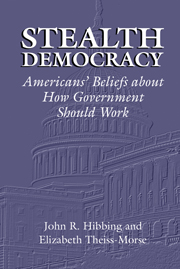Book contents
PART II - THE PROCESSES PEOPLE WANT
Published online by Cambridge University Press: 23 November 2009
Summary
We have tried to prove in Part I that process in general is important to the people. In Part II, we identify the particular process people most desire. Process can be incredibly complicated, and therefore beyond the ken of many people, but we do not claim people have detailed – or even accurate – knowledge of political processes. We do not believe many people have preferences on the minimum number of legislators that should be required to invoke cloture in Senate debate, or on whether multiple committee referral of bills should be permissible in the House. People are amazingly ignorant of political process at such levels, and why shouldn't they be? But just because they lack detailed knowledge about process does not mean people do not care about process. They do.
As we mentioned earlier, the picture painted in Part I concerning people's process preferences was somewhat misleading. People placed themselves squarely in the middle of a broad process spectrum. What does this mean? In the next three chapters we lay out the evidence that helps to answer this question. Put simply, people do not want to make political decisions themselves, but they want those who do make the decisions to be unable to make them on the basis of selfish motivations. People are amazingly attuned, hypersensitive even, to the possibility that decision makers will attempt to improve themselves at the expense of everyone else.
- Type
- Chapter
- Information
- Stealth DemocracyAmericans' Beliefs About How Government Should Work, pp. 85 - 86Publisher: Cambridge University PressPrint publication year: 2002



